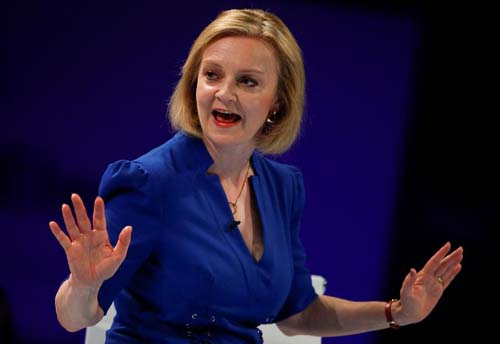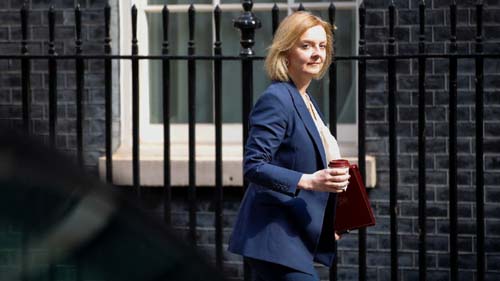
Truss bets on radicalism to save the Tories, and she’s right
Dr John C Hulsman
Despite (or perhaps because of) the Conservative establishment having lined up squarely behind her opponent, former Chancellor of the Exchequer Rishi Sunak, Foreign Secretary Liz Truss is in pole position to emerge as the new Tory leader and next prime minister of Great Britain.
The only poll since the run-off began between these final two candidates found Truss miles ahead, with 49 percent support among the party membership who will determine the winner, while Sunak languished on only 31 percent.
How has Truss upended the desires of the Tory establishment? She has adroitly grasped the fundamental desire of the UK for change, and not merely another spell being led by an affable Tory grandee. For while the Conservatives at Westminster have been engaged in a very public civil war over the defenestration of the feckless Boris Johnson, it has not been a “good look” for the party out in the country, where people are grappling with the far more serious problems of a cost-of-living crisis, rampant inflation (allowed to get out of hand by an increasingly discredited Bank of England), and a possible coming recession, even as an energy crisis threatens the whole of the Western world. While the Tories are fiddling, Rome is burning.
All of this explains the latest Politico polling on July 24, which finds the opposition Labour Party well ahead of the Tories by 41-32 percent, with the perennial third-party Liberal Democrats on 11 percent. Such an outcome would enable Labour and the Lib Dems to form a government, one of whose first acts is likely to be changing Britain’s first-past-the-post voting system to that of proportional representation. Such a change — since both Labour and the Lib Dems are left-of-center parties — would consign the Tories to opposition status for the foreseeable future.

Unlike Sunak, a steady-as-she-goes chap if ever there was one, Truss seems to sense this larger political danger. She has an answer to the basic Tory problem: How do you appear to provide fresh solutions to problems that, having been in government since May 2010, you yourself can justifiably be accused of having created? Truss, despite faithfully serving David Cameron, Theresa May, and Johnson, has adopted the mantle of a radical reformer (especially in the economic sphere) to galvanize support not only among the vital Tory grassroots who will choose the next prime minister, but also in the larger population who will determine the outcome of the next general election.
While there is little difference between Truss and the outgoing Boris Johnson over foreign policy — both are hawkish (perhaps overly hawkish) supporters of Ukraine, both are card-carrying members of the Anglosphere and its close ties with the US, and both see China as the greatest looming threat to the world’s status quo powers — over economic matters, canyons separate them. She has adroitly grasped the fundamental desire of the UK for change
At the highest macro-economic level Boris Johnson and his administration have been garden-variety followers of the late 1950s Prime Minister Harold Macmillan and his ministers — politicians who have no desire to dismantle the big state/high tax machinery but merely purport to run it better than their leftist opponents. In contrast, Truss is nailing her colors to the mast of Thatcherism, that other strain of Tory thinking on policy, pushing for lower taxes, and the freeing of the animal spirits of capitalism to realize the country’s economic potential at the micro-economic level.
Karl Marx, so wrong about so much at the practical policy level, was right in his definition of radicalism: “To be radical is to grasp things by the root.” If the Tories were to choose Truss’s rival Sunak, whose competent go-along approach may well mitigate the worst of the coming economic crisis without ever mastering it, her belief is that this would doom the Tories to nothing better than a respectable defeat at the next general election, and the political oblivion that may well follow. Instead, in pushing a radical Thatcherite agenda of tax cuts, she is radically trying to master the economic crisis itself.
Truss founded the laissez-faire Free Enterprise Group of Conservative MPs in 2011 and seems intent on governing in this more radical spirit. While the Johnson premiership disastrously planned to increase corporate taxes from 19-25 percent over the next few years, and with overall British taxes at a 50-year high, Truss intends to reverse this slide into Macmillanism.

But there is no doubt Truss is gambling. For while she is squarely behind tax cuts, she disdains the spending cuts and austerity (think Cameron) that would make such an economic policy revenue neutral. Instead, she plans to go along with Johnson’s plans to throw dollops of cash at the horribly run (but much loved) National Health Service. Truss also plans to increase British defense spending significantly, to fully 3 percent of GDP, even beyond Johnson’s increases. She is betting that tax cuts pay for themselves in terms of increased economic activity, and that the Bank of England gets its act together and aggressively raises interest rates so the inflationary effects of her spending plans are masked.
This amounts to quite a policy and political gamble, but Truss is right about one big thing. To fail to be radical at this stage would surely lead to a Tory election defeat. To avert that, radicalism is the only plan she has.
The writer is the president and managing partner of John C Hulsman Enterprises, a prominent global political risk consulting firm
